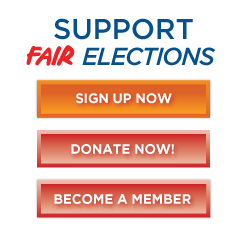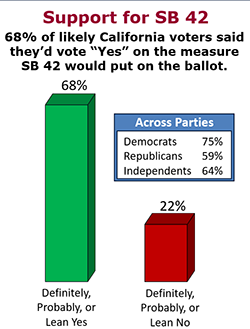CULVER CITY, CA -- A poll conducted of 661 likely November
2020 California voters between July 22nd and August 22nd
(2019) showed that an overwhelming percentage of voters say
it is important to them to know who supports and opposes
ballot measures when they vote, but that many of them
aren't confident they know this information or think it's
easy to find -- issues addressed by SB 636, the Ballot
DISCLOSE Act. A parallel poll showed that SB 636 would
have a significant positive impact on how voters say they
would vote on past ballot measures.
The poll found that 79% of likely November
2020 voters say it's important to them "to know who
supports and opposes ballot measures when they
vote". These results hold across the political
spectrum with 84% of Democrats, 80% of Republicans, and 70%
of Independents saying supporters and opponents were "Very
important" or "Somewhat important" to know.
Despite the importance of this information to the vast
majority of voters, the poll further found that
only 21% of likely voters were very
confident they knew the important supporters and opponents
of ballot measures when they vote. And although the
ballot pamphlet lists key supporters and opponents who
signed the official arguments for and against ballot
measures, only 42% of likely voters said
they "know how to find propositions' supporters and
opponents in the ballot pamphlet and it's quick and
easy". The rest said it wasn't quick and easy, that
they didn't know where to find them in the ballot pamphlet,
or that they didn't even know they could find them
there.
These results probably explain why the poll also found that
75% of likely voters favor "adding to the
ballot a short list of the supporters and opponents of each
ballot proposition" -- precisely what SB 636, the
Ballot DISCLOSE Act would do. Support was across
the board with 80% of Democrats, 72% of Republicans, and
70% of Independents in favor.
Authored by Senator Henry Stern (D-Calabasas) and sponsored
by the California Clean Money Campaign, SB 636 would add a
short list of the supporters and opponents who signed the
official arguments for and against a measure in the ballot
pamphlet to the current 75 word title, summary, and fiscal
analysis already shown on the ballot. A maximum of 15 words
describing the supporters and 15 words describing the
opponents would be added.
"The results of the poll confirm that the vast majority
of voters want to know who supports and opposes ballot
measures when they vote, but often don't know who they are
and can't easily find them," said Trent Lange,
President of the California Clean Money Campaign, sponsor
of SB 636. "The Ballot DISCLOSE Act will provide that
crucial information to voters when and where it matters
most -- on the ballot itself."
A second survey of 622 likely November 2020 voters included
questions showing how the ballot would look with SB 636 in
place (using actual previous ballot propositions) found
that SB 636 would have a significant positive impact on how
people say they would vote.
Together, the surveys found that having SB 636's short list
of official supporters and opponents as part of the ballot
labels increases by 9% the voters
who say they would vote "Yes" on measures supported by one or more organizations they
trust and not opposed by any they trust. Similarly, SB 636
decreases by 9% the voters who say
they would vote "No" on measures opposed by one or more organizations they trust
and not supported by any they trust.
Both polls were conducted online by the California Clean
Money Campaign using respondents weighted to match a likely
November 2020 California turnout model by party, gender,
age, and race. To compare how voters said they would vote
with versus without SB 636, the first poll asked
respondents how they would vote using the actual ballot
title, summary, and fiscal analysis on five past
propositions. The second poll asked how different but
demographically matched respondents would vote on the same
propositions but with the short list of official supporters
and opponents included as required by SB 636. Both polls
later provided respondents with a list of organizations and
asked whether knowing whether they supported or opposed a
proposition would make them more or less likely to vote the
way the organization recommended. The margin of error of
each poll is +/-4%.
"Sunshine is the best disinfectant - and the CA
DISCLOSE Act cleared many of the clouds that inhibit
transparency in our elections," said Senator Henry
Stern, author of SB 636. "But voters still deserve to
know who's behind ballot measures when they vote on them.
SB 636 will provide this critical information."
SB 636 passed the Senate on an overwhelming bipartisan vote
of 31-5 last year before becoming a two-year bill. It will
be heard in the Assembly Elections Committee sometime later
this year. A more detailed presentation of the SB 636 poll
results can be found here. A Fact Sheet describing the bill can
be found here.
"DISCLOSE" is an acronym for Democracy is Strengthened by
Casting Light on Spending in Elections.
The California Clean Money Campaign is a non-partisan
501(c)(3) organization that has been dedicated to educating
the public about the need to lessen the unfair influence of
Big Money on election campaigns since 2001. For further
information, visit www.CAclean.org.



